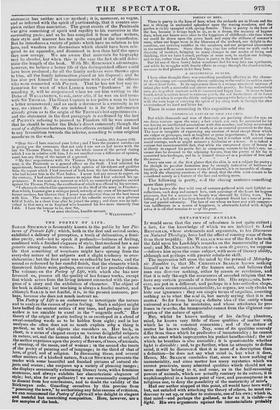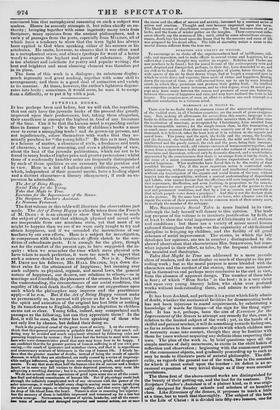METAPHYSIC RAMBLES.
IT would seem that the race of' schoolmen is not quite extinct ; a fact, for the knowledge of which we are indebted to Lord. BROUGHAM, whose statements and arguments, in his Discourse on Natural Tlicology, have had the effect of rousing some of them from their torpidity. Dr. WALLACE was one of the first who took the field upon his Lordship's remarks on the immateriality of the soul; and Mr. CHRISTIAN SEARCH—a nom de guerre, we Suppose —follows him upon the same subject, with more of literary ability, although not perhaps with greater scholastic skill. The impression left upon the mind by the perusal of 3letaphr. sic Rambles i, that Mr. CHRISTIAN SEARCH knows noth;ng himself as to the nature of the human soul, and believes that man can discover nothing, either by reason or revelation, and that it is only through the assurances of revealed religion that we have any certain grounds of a future life. His arguraents, how- ever, are put in a different, and perhaps in a less orthodox shape. The words immaterial, immateriality, lie argues, are only cloaks to hide our ignorance : they are simple terms of negation, asserting nothing as to what the scut is, but merely saying that it is not matter. So far from having a definite idea of the entity whose universal exiitence he maintains, and whose attributes he pro- fesses to deicribe, the immaterialist cannot form the slightest con- ception of the nature of spirit. But, whilst he knows nothing of his darling phantom, mind, he knows very little of those qualities of matter with which he is in constant connexion ; and of the nature of matter he knows nothing. Nay, some of its qualities scarcely differ from those which he predicates of immateriality ; he cannot see the scent which impregnates his pocket-handkerchief; the air which he breathes is also invisible ; it is questionable whether light is divisible ; and, to go further, when he attempts to define mind, it will be discovered that it is more of a description than a definition—he does not say what mind is, but what it does. Hence, Mr. SEARCH concludes that, since we know nothing of immateriality, and since matter has many mysteries which we cannot penetrate, many admitted qualities which should not as mere matter belong to it, and some, as in the half-reasoning powers of animals, which are actually contrary to its nature, it is unphilosophical in a human point of view, and presumptuous in a religious one, to deny the possibility of the materiality of mind. Had our author stopped at this point, all would have been well; but, not satisfied with attacking the theory of others, he must en- deavour to set up, or rather to insinuate, one of his own; which is, that mind—and perhaps the godhead, so far as it is visible—is light. His own arguments against the immaterialists probably convinced him that metaphysical reasoning on such a subject was useless. Hence he scarcely attempts it, but relies chiefly on au- thority; bringing together with some ingenuity many texts from Scripture, many opinions from the ancient philosophers, and a vane y of passages from the poets, especially from MILTON, all of which have a tendency to show that the term light has always been applied to God when speaking either of his essence or his attributes. He omits, however, to observe that it was often used in a metaphorical sense, and always (perhaps for want of a better word) to express the highest and purest of substances. Spirit is too abstract and indefinite for poetry and popular writing ; the best and brightest and most cheering element was therefore put in its place.
The form of this work is a dialogue ; its substance displays much ingenuity and great reading, together with some skill in arrangement; and there is a good deal of animation and variety in its manner. At times, however, the author's lightness degene- rates into levity ; sometimes, it would seem, he uses it to escape from a difficulty, or to put it by with a jest.



























 Previous page
Previous page